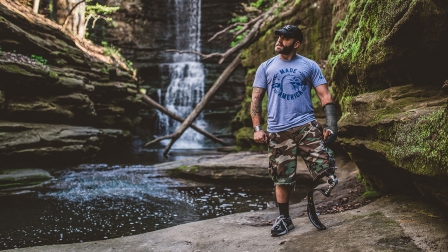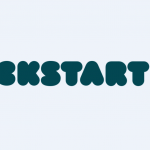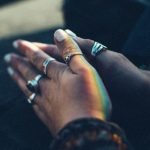How A Startup Founded And Operated By Paralyzed Vets Made A Clothing Line That Matters
Strength comes in a variety of forms, including T-shirts.
Oscar Mike is a startup clothing label owned and operated exclusively by paralyzed veterans of the American military. Every piece of apparel they sell reflects the values of our armed forces, including T-shirts with a tattooed, muscular Uncle Sam, or emblazoned with the slogan, “Fight the good fight.”
In 2003, Marine Noah Currier, 21, returned from combat in Iraq to his native small town of Marengo, Illinois. On his third day back, while driving to a Marine Corps base, he was struck by a trucker who fell asleep at the wheel. The car rolled down an embankment, leaving Currier with a paralyzed spinal cord.
Following a painful recovery, Currier didn’t want to leave his house. “I was in a dark place for a while and didn’t really want to talk to a human being,” he recalled.
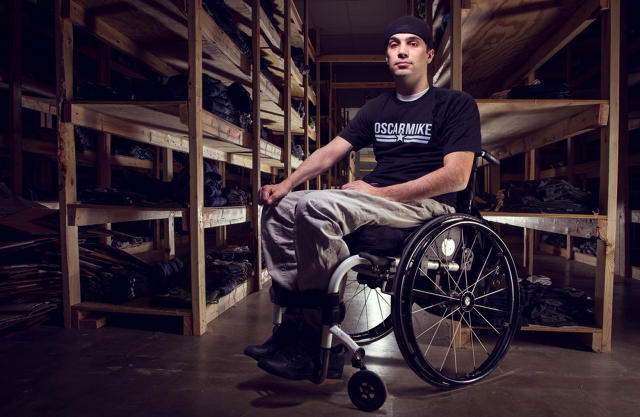
Currier’s perspective changed after a friend begged him to attend an adaptive sport event for veterans. “It changed my life,” he said. Currier wanted to attend more, but when he asked his peers if he’d see them at the next one, they all had the same response: If I can afford it.
“I realized money was the barrier of entry for these life-changing opportunities and I just wanted to help in any way I could,” he said.
The frustration sparked a desire that manifested itself in a fundraiser in which he sold T-shirts with a motto embraced by all branches of service: “He who sheds blood with me shall forever be my brother.” The modified Shakespeare quote resonated with attendees, who quickly snapped up the design. It motivated Currier to think beyond single events. His vision was to help disabled vets afford sporting events, and simultaneously inspire people.
Currier decide to name his clothing label Oscar Mike, a command meaning “get on the move.” The phrase was repeatedly voiced on the radios during the invasion of Iraq, the military version of “just do it.” He applied for nonprofit status in 2011, but after the government informed him it would take close to two years to get approval, Currier shifted gears: Why not just start a business that acts and serves as a nonprofit?
Her opted for an LLC, just him and two other paralyzed veterans designing T-shirts out of a garage. To them, it was more than just a business. It was a way to stay moving.
“I feel that for myself and everybody I knew at the time, getting active or staying active was the launching pad of improving your life,” explained Currier. “That’s something that resonates with a lot of people because when you start an activity or set new goals in life, one thing leads to another in setting a positive chain reaction.”
Currier’s nimble team set about manufacturing the entire line in the U.S. It was “extremely important” for Oscar Mike to serve Americans throughout the entire process, from the manufacturer owners to the eventual buyer. Currier, accustomed to the military’s fast-paced productivity, couldn’t justify the lengthy process of producing fabrics in the States, shipping them overseas, then shipping them back home.
“You can have a whole list of excuses for why it can’t be made in the U.S. and I understand when public companies are being steered by their shareholders and are always trying to improve their margins,” explained Currier. “But with us, the margins didn’t matter. If it can be made here, it should be made here.”
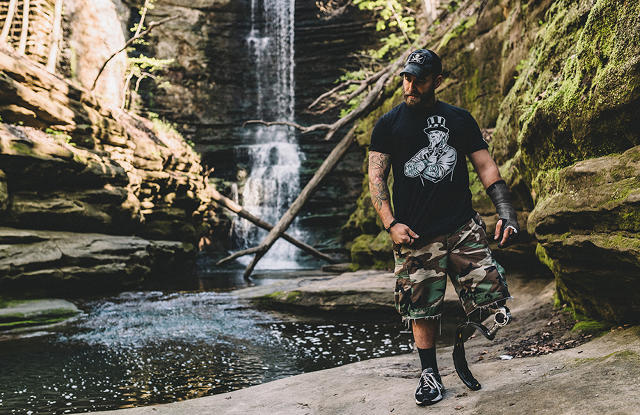
By the time Oscar Mike was approved as a nonprofit in 2013, the young entrepreneur completed two Kickstarter fundraisers and solidified a strong organic marketing strategy by reaching out to veterans organizations. From there, it split into two divisions: a nonprofit partnering with sporting events to accommodate veterans, and a for-profit selling veterans-inspired gear. All profits, said Currier, go to the foundation.
Since 2012, Oscar Mike has doubled in size year-over-year. The company works with a dozen American manufacturing companies and employs 12, all veterans save for one.
Most importantly, the company succeeded in its initial mission: to send more than a hundred disabled vets to 10Ks and competitive sporting events like Tough Mudder or Warrior Dash. The community surrounding these events is a strong one: it quickly rallies around their wounded competitors.
“Things that people thought were physically impossible, we make possible,” said Currier of amputees scaling walls and forging through freezing cold obstacle courses. The participation is two-fold: It uplifts veterans, but it also acts as the best kind of marketing for the apparel. “Everybody at a race passes us because we’re always the slowest group helping guys in wheelchairs and amputees. So 5,000 people enter a race, all 5,000 of them pass us at some point and make it a point to come up to us afterward and give us hugs and congratulate us, all teary-eyed and motivated.”
Oscar Mike supplies gear and branded clothing to over a dozen veterans organizations. For many, it wasn’t until Currier approached them with the power of products did they consider retail ventures. It reaches an audience who can physically wear their pride.
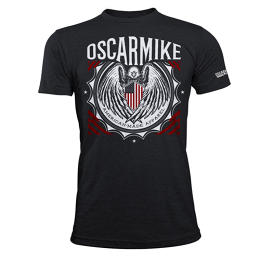
Paralyzed Veterans of America, for example, will roll out its new website featuring stories of severely disabled veterans with Oscar Mike’s shirts. “It was intended to appeal to the younger generation and it does that,” said executive director Sherman Gillums Jr., a retired U.S. Marine officer and fellow paralyzed veteran. “It helps freshen the message.”
Within three years, Oscar Mike sales reached over half a million, a milestone Gillums attributes to not only the design and comfort of the shirts, but its unique backstory. Oscar Mike is identified with heroes who bear physical sacrifices made for their country.
“You can’t help but draw together the product with what it represents,” said Gillums, emphasizing the line’s featured quotes that helps non-veterans understand military personnel’s struggles. “These are products that tell a story.”
The Iraq and Afghanistan Veterans of America (IAVA) collaborates with Oscar Mike for exclusive products at their events, including most recently, the Commander-in-Chief presidential forum between candidates Hillary Clinton and Donald Trump.
“That way we look at it: Livestrong had Nike and IAVA has Oscar Mike,” said Paul Rieckhoff, founder and CEO of IAVA. Sales of Oscar Mike products are high on IAVA’s website—items such as branded ripcord bracelets in an eye-catching “night vision green” meant to spark conversations.
The organization, currently the largest post-9/11 veterans group in the country, is eager to boost veteran-owned businesses, but seldom come across ones at this level. “You’ve got to be able to understand the culture but you also got to be able to deliver at scale, and these guys can do it all,” said Rieckhoff.
“But it’s not just about sales: it’s about engagement,” stressed Rieckhoff. “We’re trying to reach a vet who has been isolated, who really hasn’t been able to connect, and it might be a really cool piece of gear that gets him or her hooked in.” In that sense, Oscar Mike supplies creative ways for veterans and supporters to connect with the brand and the community. “That’s what we need as a small nonprofit with limited resources.” So far, Oscar Mike and the IAVA partnered together on roughly 600 events.
Rieckhoff isn’t surprised by what Currier has achieved. A former infantry rifle platoon leader in Iraq, he knows that the live combat experience can cultivate an extremely tough entrepreneurial attitude. He witnesses veterans bringing a certain level of integrity to business. “For Noah, what he’s been through in his life, starting a business might actually be one of the easier things.”
That kind of grit pushed Currier’s team to actively pitch Dick’s Sporting Goods until they secured a meeting at their Pittsburgh headquarters. The retailer agreed to start with 50 stores.
“We believe that sports make people better,” said Ron Baime, senior vice president and general merchandising manager. “Dick’s has a natural connection with Oscar Mike, whose mission is to keep America and our injured veterans ‘on the move’ and active through sports. We’ve made it our mission to support initiatives that inspire and enable sports participation, such as the Oscar Mike brand.”
The the plan is for the line to be in all doors by 2017. Oscar Mike wants to make amputee mannequins as part of their display, “to really put it in the public’s eye,” hopes Currier.
When Oscar Mike first launched, a dozen veterans organizations existed. Today there are thousands. “Corporate America was giving a lot of money to veterans causes,” said Gillums of post-9/11 America. “A lot of cases it was about charity… The proliferation is a reflection of how much the country wanted to get behind veterans.”
Currier welcomes the competition and sense of brotherhood within the military community. “Having a ‘by us for us’ organization, we were able to understand what veterans need,” he said, adding, “it was about time veterans started taking care of veterans.”
This fall, Oscar Mike will release a line of women’s shirts and the company has been approached by big brands for licensing options. Currier, however, isn’t eyeing an exit strategy anytime soon. His first priority is ensuring profits benefit the foundation. “We don’t want to be giving pieces of the pie away to someone who is in it for the money,” he said, though he is open to considering an investor who sees their vision.
There’s a bigger story here than just Oscar Mike: Currier’s story is an American success story, said Rieckhof. “I think too often people think veterans are going to be your next security guard, but they can also be your next Mark Zuckerberg,” he said. “We believe veterans are rising; they’re not victims, they’re not broken or damaged. they are our leaders with amazing potential. …There are going to be a couple of billionaires that come out of our generation of veterans and Noah might just be one of the first.”
Despite his past challenges, Currier can’t help but consider himself “the happiest guy in the world” for his ability to work with peers and push them in the right direction.
“I’m still paralyzed from the neck down, but it is what it is: I’ve moved on,” said Currier, fully embodying his company’s philosophy. “All it did was open a whole new set of challenges for me to conquer.”
Fast Company , Read Full Story
(62)

